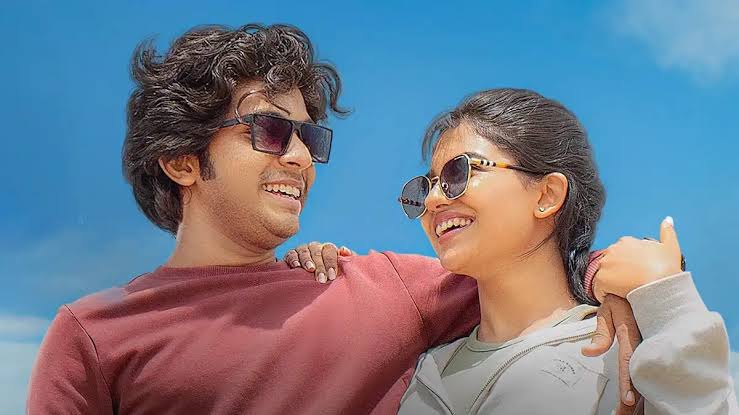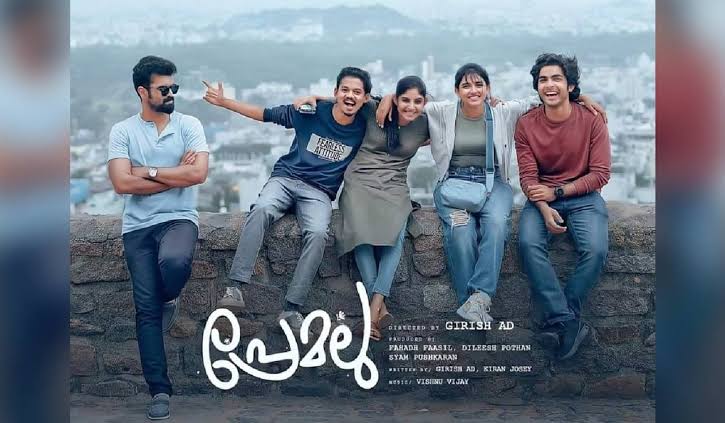
This is a reflection highlighting some primary thoughts after watching “Premalu“, the director Gireesh AD’s third Malayalam romantic comedy following the widely received “Thanneer Mathan Dinangal” and ” Super Sharanya.” The movie produced by Bhavana Studios , co-written by Kiran Josey and the director himself, is a contemporary story of young adults, set primarily in the metropolis of Hyderabad where Reenu (played by Mamitha Baiju) finds herself posted in a corporate company in Hyderabad. Karthika, (played by Akhila Bhargavan), Aadhi (played by Shyam Mohan) and Subin ( played by Shameer Khan) are all her Malayali colleagues who form the background of the story. The director gives Hyderabad its due representation alongside widely romanticised Bangalore and Sachin (played by Naslen K Gafoor) is also in Hyderabad, but unlike Reenu, he is struggling to find a direction and is driven by the urge to escape a tumultuous household. He has followed his school friend Amal Davis ( played by Sangeeth Prathap ) to join GATE coaching out of desperation.
Sitting in the third row just a few metres away from Sachin and Reenu it is exactly that distance, or lack thereof that for me was so difficult to ignore after two hours of non stop laughter. Except, the closeness and inseparableness that I felt from their world was depressing. I had to sit with these feelings for over a week before I could pen them down. The overwhelming amount of positive and only positive response that Premalu has been receiving delayed it further but also forced me to write it up. Not that the applause for the movie was unsubstantiated, in the recent years, with the previous movies of the director Gireesh AD himself, with the writings of Althaf Salim and the likes of Premam, we have been witnessing the resurgence of plain, verbal, situational and observational comedy based on relatability underlined with pure temporal pulse that is very hard to keep away from becoming cringe. In that light, if it worked, it really did work, and the credits that must go to the writing, the screenplay and the direction is paramount, not to mention the performances. The attention the actors, especially Naslen’s Sachin and Sangeeth Prathap’s Amal Davis are receiving post the release on 9th February 2024 is self explanatory for anyone who has watched the movie. They have made the characters both memorable and lovable. You want them to be around you, so you could adore them and vibe with them, even if from a distance. Adi’s and Subin‘s character played by Shyam Mohan and Shameer Khan respectively, even though a caricature is relatable and resembles somebody’s not so exaggerated mannerisms in all our lives. But despite all this, despite all the laughter and admiration that I was filled with for the most part of two hours, I came home confused, depressed and troubled.
Premalu invoked a sense of loneliness in me, a feeling of being the wrongdoer, a feeling of being alone in a perspective, like in a lone fight that I am destined to fail. The movie post the scene where Adi and Sachin get into an argument in the party in the second half is where things get tricky. Up until then, the movie was earning points every other second, but after that verbal brawl it left me like hope leaves a rat in a bait trap.
Naslen’s Sachin represents the typical “fem boy” for a lack of a better word, the “type” that has been visibly growing in acceptance and adoration both among females generally, and genz guys especially. They are sensitive, expressive, vulnerable, emotional, need care and assistance and are lot of times openly dependents. But more importantly they are very comfortable in being the ones who lean and learn, some of what used to be attributed to the friend or the side character in movies in the previous decades. Films from the likes of Kumbalangi (2019) and Kathal (2023) etc have been celebrating the vulnerable expressions of men, slowly bringing in an acceptance to these characters along with the general feminist narratives being popularised in global content and local cultures. But Sachin probably is a complete embodiment of a character who is innately just like that without any particular reasons of trauma (conveyed) or back story, and who is not boxed or trolled for his nature. His friendship or his perception isn’t unidimensional, he can very well be a random pick from the 20 year olds. He rises to his own defences when necessary and leads a simple life avoiding unnecessary complications and is following opportunities and possibilities to escape his current situations. Things are fine and quite beautifully enacted through the first time he expresses his interest in Reenu, the disappointment, the remnant hopes that makes him try once again leading on to the actual proposal. But the second time that they confront the matter post rejection, the story takes a very abrupt turn, making it the same old guy gets girl no matter what story in a very macho way within a short span of time. It’s his avoidance that forces her to a conclusion, making her realise his value through the absence, she is shown as in denial of how much she “enjoyed caring’ for him and the justification for whoever might doubt this is put to rest with an earlier mention of how her previous partner ended things because of her ‘over caring nature’. She is portrayed as someone who doesn’t care for the others, because she is very well aware of leading on the two guys. This again feeds into the usual agreement amongst men of desired “girls playing with them” which is what stands out even in the tussle between the two competing men, the tone is of a defensive camaraderie vilifying the girl. By forcing a climax such as this probably for catering to a big tent, what they end up doing is to reaffirm the stereotypes about women and women who engage with excessively male dominated spaces- both personal and professional. They underline that any woman’s care is always and essentially the signifier of romantic alignment, even if she claims not to have felt so. Now I am not denying that she could have been in denial or that she could have been wrong, but that the means of how it is portrayed and how she comes to the realisation somehow always seems to be monochromatic. Though it is a not so fresh but not told enough idea that care and liking are fertile grounds for romance to build equally at par with physical attractions, it’s a crime to make them inseparable and to further reaffirm that care is equivalent to romance when coming from a woman. They also end up stating that loneliness is the real test of love, and that the guy had been correct all along. Here I would like to extend this to add a dimension to the idea of carefree women in Surabhi Yadav‘s project Basanti: Women at Leisure, where she calls upon guilt, self doubt and everything that restricts women from enjoying leisure and pleasure. It’s high time that women and care be disentangled, even in relationships, and agency be given back to women to employ or disemploy care at will, and by choice.


They in a convoluted way patronise Sachin, the feminist counter part to the controlling alpha that is summoned in Adhi, by calling Sachin a dimwit and closely interlinking it with his nature itself, with his incapabilities to be decisive or to take up lead except for when it is in chasing Reenu, in a way pushing the audience to glorify the macho-ness in him while demeaning the feminine-ness. They also do further harm by restating in the end as though it’s the take away that Reenu desiring a settled mature guy were her having high standards, and that people with such standards end up with dimwits. In another story it could have been a funny turn out, but here it’s a regressive take on portraying progress. It somehow doesn’t land as “just a joke”.
Essentially a character that represents the reform and progress seen in recent years is put in a story that is from an extreme male gaze, which is not a problem inherently but becomes one when it ends up appropriating a feminist symbol to serve patriarchal notions of genders. The story could have very well taken to a novel and empowering end and the humour would have still worked, but it didn’t deviate from the usual. That accentuates my sadness, that even when there are possibilities to do it differently, hardly anyone, especially once who should be so confident about their storytelling ends up looking the other way. Either it is a conscious choice to please the audience with a unanimously agreed safe happy ending or it was subconscious. But when every other story reaffirms the same thing in all kinds of movies, be it Darshana’s character in Hridayam who is sad of having parted with her first love but couldn’t let him go, or thousand other stories, that serve the same wine in more and more appealing bottles, it’s hard to ignore how lonely it makes someone like me feel in their fight to exist wherein they could care without fearing a reading that wasn’t intended. It feels like a warning that repercussions will follow, for having been audacious enough to exist as one’s expressive selves.
Some might call me a spoil sport for this, but I really did keep it all aside while watching, minute after minute and I am in immense awe of the clever dialogues, warming humour and attentive observations. But like how a “jk” isn’t always so innocent, some benefit of doubt needn’t always be given. I think I can laugh despite the problems that I saw and not necessarily have to ignore them. The realisation that my ignoring these problems don’t really take them away makes me want to scream that no one else also needs to ignore it to enjoy it.
Zakhiya PC is a PhD scholar studying social systems in primates at the National Institute of Advanced Studies.



